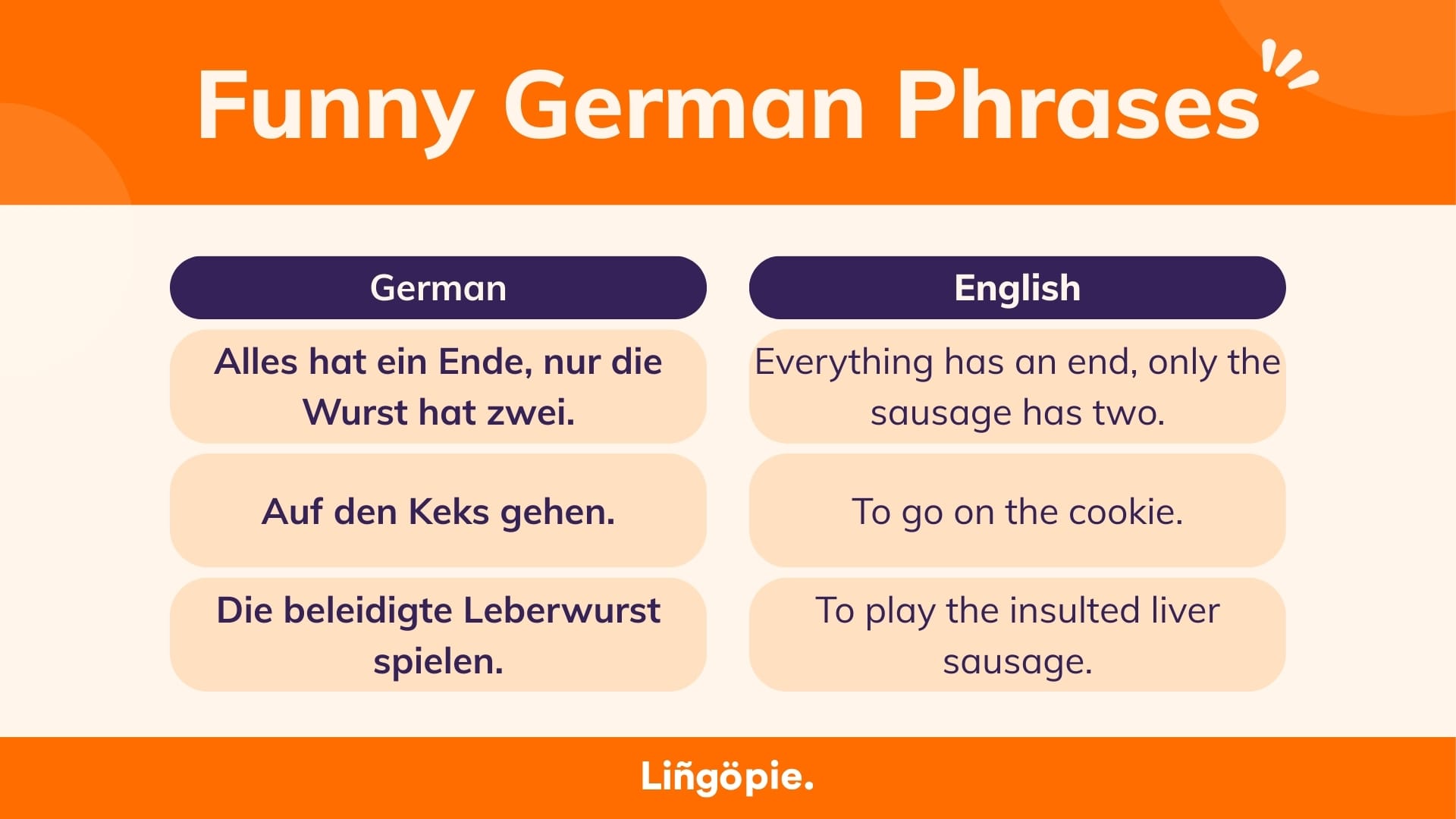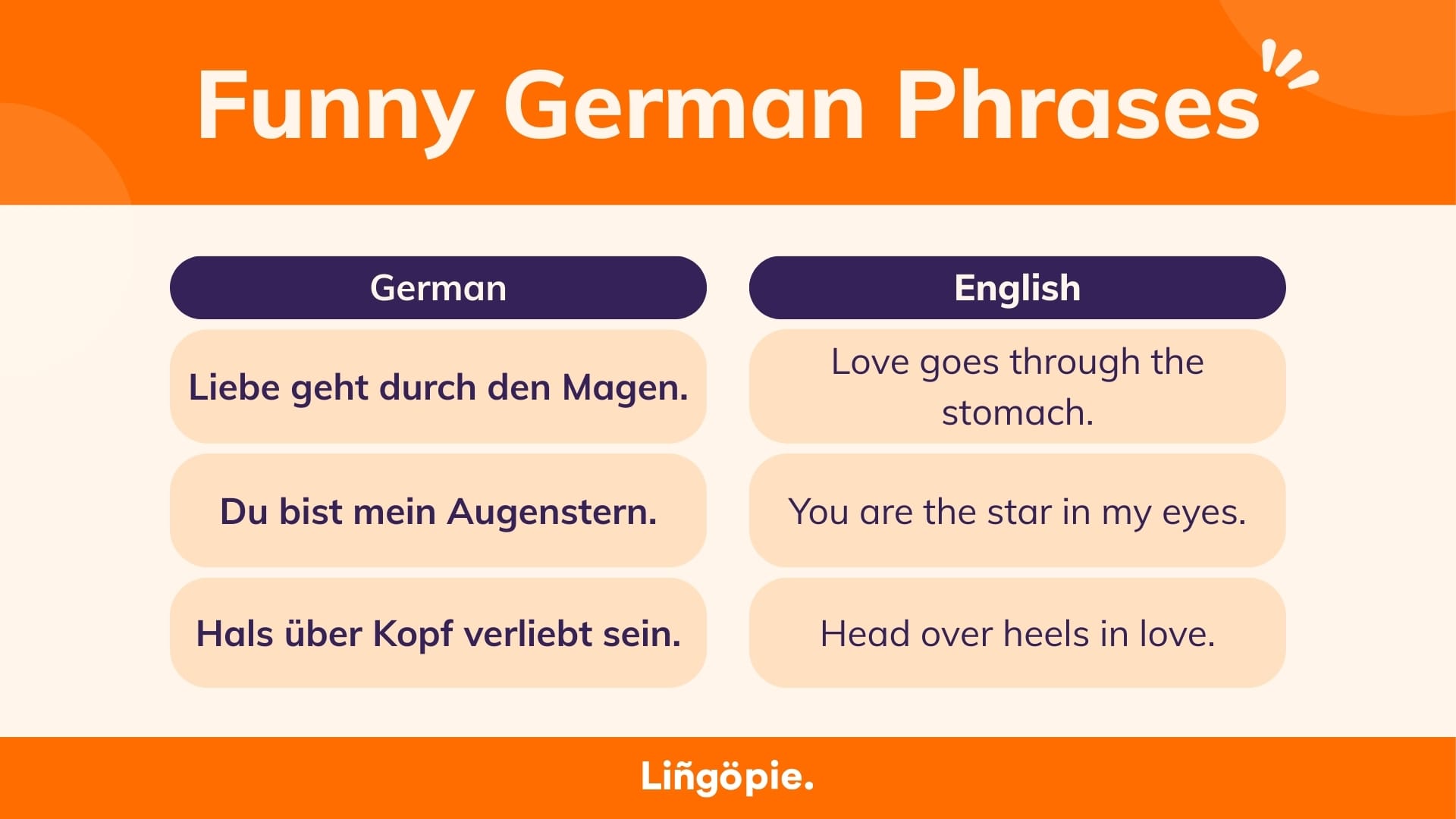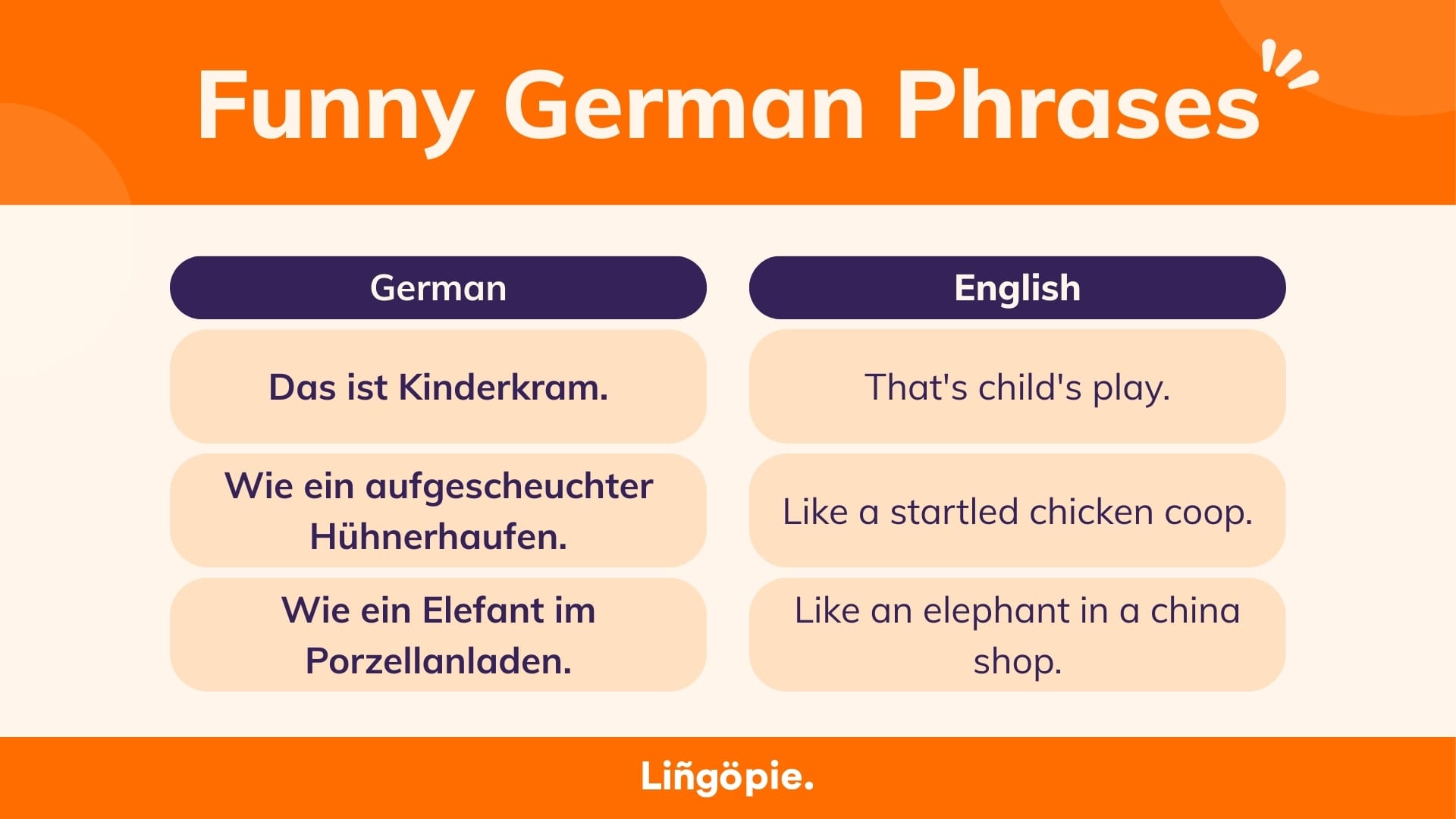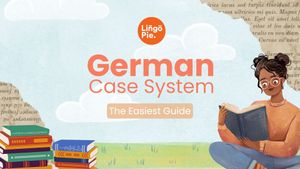You might already know how to say love in German, but the language has much more to offer than romantic phrases. Hidden in everyday conversations are expressions that sound completely absurd when translated literally. Some involve sausages, others involve animals, and many make perfect sense only once you understand the culture behind them.
In this article, you will find over 50 funny German phrases along with their true meanings. Each expression includes a short explanation that helps you see how Germans use humor in daily life. These sayings reveal a side of the language that is clever, strange, and surprisingly honest.
- 20 German Slang & Phrases You Need to Learn
- 100 Most Common German Words and Phrases
- 15+ Words and Phrases for Asking and Giving Directions in German

Why German Has So Many Odd-Sounding Phrases
German often sounds strange to learners because it combines directness with vivid, metaphorical thinking. The language forms long compound words, uses expressions based on cultural imagery, and follows grammar rules that make literal translation confusing.
Here are the main reasons why German phrases often seem unusual:
- Compound words: German stacks simple words into long terms like Kummerspeck (grief bacon) or Fernweh (distance pain) that are deeply expressive but odd in English.
- Visual idioms: Many phrases rely on imagery, such as Tomaten auf den Augen haben (to have tomatoes on your eyes), meaning someone is oblivious.
- Strict word order: Verbs often appear at the end, which can sound reversed to English speakers.
- Untranslatable particles: Words like doch, halt, or mal change tone or meaning subtly, but don’t exist in English.
- Regional slang: Local dialects add phrases that may seem grammatically off but are common in everyday speech.
These elements combine to create a language that feels both highly structured and creatively expressive. What may seem strange at first often becomes one of the most entertaining parts of learning German.
Funny German Phrases Relating to Food

Like all of us, the Germans love their food. So, it's no surprise that their language reflects this passion with a buffet of amusing phrases. See what we did there?
Here are fifteen culinary expressions that will not only tickle your taste buds but also add a dash of humor to your German language journey.

1. “Alles hat ein Ende, nur die Wurst hat zwei.”
Literal translation: Everything has an end, only the sausage has two.
This humorous phrase reminds us that everything eventually finishes, just like a sausage, which has two literal ends. It is often used at the end of a fun event or relationship to signal that the good times are over, with a touch of lightheartedness.
2. “Auf den Keks gehen.”
Literal translation: To go on the cookie.
This is a casual way to say someone is getting on your nerves. It is commonly used in informal conversations, similar to saying "you're annoying me" or "you're driving me crazy."
3. “Die beleidigte Leberwurst spielen.”
Literal translation: To play the insulted liver sausage.
Used when someone is acting overly sensitive or sulky, this phrase pokes fun at people who take offense too easily. It’s like calling someone a drama queen, but with a very German twist.
4. “Kummerspeck.”
Literal translation: Grief bacon.
This term refers to weight gained from emotional eating, especially during stressful or sad times. It literally means “grief bacon” and is often used jokingly when someone admits to comfort eating.
5. “Jetzt haben wir den Salat.”
Literal translation: Now we have the salad.
Said when a situation turns into chaos or something goes wrong, this phrase means “now we have a mess” — the German equivalent of “now look what you've done.”
6. “Kabelsalat.”
Literal translation: Cable salad.
Literally “cable salad,” this expression is used for a tangle of wires or a messy situation in general. It’s perfect when your charging cables are a knot or a technical setup becomes confusing.
7. “Das Blaue vom Himmel versprechen.”
Literal translation: The blue promise from the sky.
Used to describe someone making unrealistic promises, this phrase warns that the speaker is offering more than they can deliver. Think of it as promising the moon and stars.
8. “Leben wie Gott in Frankreich.”
Literal translation: To live like God in France.
This phrase expresses the idea of living in total comfort or luxury, often with great food and no worries. It’s used admiringly to describe someone who seems to be enjoying life to the fullest.
9. “Luftschloss.”
Literal translation: Air castle.
Literally an “air castle,” this word describes unrealistic dreams or plans. It refers to ideas that sound grand but are unlikely to ever become reality — similar to a “pipe dream” in English.
10. “Klappe zu, Affe tot.”
Literal translation: Close the lid, the monkey is dead.
Blunt and a bit dark, this phrase signals that something is completely over. It’s often used to close discussions or declare the end of a situation with finality.
11. “Treppenwitz.”
Literal translation: Staircase joke.
This describes the perfect comeback or clever remark that only comes to mind after the conversation has ended — literally “staircase joke,” because it hits you when you’re already walking away.
12. “Sich die Rosinen herauspicken.”
Literal translation: To pick out the raisins.
This refers to someone cherry-picking only the best parts of a deal or situation while ignoring the rest. It’s often used critically when someone avoids effort but takes the benefits.
13. “Einen Zahn zulegen.”
Literal translation: To put a tooth on.
Originally from steam engine terminology, this phrase means to speed up or move faster. It’s often used when urging someone to hurry, similar to “step on it.”
14. “Tomaten auf den Augen haben.”
Literal translation: To have tomatoes on the eyes.
Said about someone who fails to notice something obvious, this expression means they are being completely unaware or oblivious to what’s right in front of them.
15. “Jemandem Honig um den Mund schmieren.”
Literal translation: To spread honey around someone's mouth.
This means to flatter someone excessively, often to gain favor. It carries the sense of insincerity, like buttering someone up to get what you want.
Funny German Phrases Relating to Everyday Life

Life's daily grind gets a humorous twist in German expressions. Dive into the lighter side of everyday situations with these German words and phrases that capture the quirks and charms of daily life in Germany.

16. “Leben ist kein Ponyhof.”
Literal translation: Life is no pony farm.
This saying means that life is not always easy or fun. It’s often used to remind someone that they cannot expect everything to go their way. The phrase contrasts real life with an idealized, carefree setting like a pony farm, which symbolizes simplicity and enjoyment.
17. “Du gehst mir auf den Keks.”
Literal translation: You're walking on my cake/cookie.
A casual and slightly humorous way to tell someone they are getting on your nerves. It literally involves stepping on a cookie, making it playful rather than harsh. Common in everyday conversation among friends or family.
18. “Ich glaub ich spinne.”
Literal translation: I think I spider.
This phrase expresses disbelief or shock, similar to saying “I must be going crazy” or “I can’t believe this.” It is often used when something strange or unexpected happens and the speaker is momentarily overwhelmed.
19. “Jetzt haben wir den Salat.”
Literal translation: Now we have the salad.
Used when a situation becomes chaotic or messy, especially due to someone’s actions. It signals a problem that can no longer be ignored, much like saying “great, now we’re in trouble” in English.
20. “Das Blaue vom Himmel versprechen.”
Literal translation: The blue promise from the sky.
This describes someone making exaggerated promises that are unlikely to be fulfilled. It suggests overpromising to gain favor, similar to promising someone the moon, with a warning not to take such claims seriously.
21. “Fremdschämen.”
Literal translation: Exterior shame.
A unique German term for the feeling of secondhand embarrassment. It describes the discomfort of watching someone else do something cringe-worthy, even though you are not involved directly. It’s commonly used when viewing awkward behavior in public or online.
22. “Leben wie Gott in Frankreich.”
Literal translation: Live like God in France.
This expression means living in comfort and luxury, usually with good food and relaxation. It reflects the stereotype of a rich, indulgent lifestyle and is used to describe people who seem to have everything going right for them.
23. “Luftschloss.”
Literal translation: Air castle.
Literally a “castle in the air,” this word refers to grand ideas or dreams that are unrealistic or unlikely to become reality. It is used to describe overambitious plans with no practical foundation.
24. “Klappe zu, Affe tot.”
Literal translation: Close the lid, the monkey is dead.
A blunt way to signal that something is finished or should be dropped. It’s used to end a discussion or situation decisively and is often meant to add a touch of finality or dark humor.
25. “Treppenwitz.”
Literal translation: Staircase joke.
This refers to the witty comeback or perfect reply that only comes to you after the conversation has already ended. The name comes from the idea that the joke arrives too late, as you’re walking down the stairs after the moment has passed.
26. “Sich die Rosinen herauspicken.”
Literal translation: To pick out the raisins.
Used when someone selects only the best parts of a situation while ignoring the difficult or less appealing aspects. It often carries a critical tone, implying selfishness or unfairness.
27. “Einen Zahn zulegen.”
Literal translation: To put a tooth on.
This phrase means to speed up or get a move on. Originally from old cooking stoves where adjusting a gear or “tooth” changed the heat level, it now works as an informal way to tell someone to hurry up.
Funny Yet Romantic German Phrases

Even though German is not traditionally seen as a romantic language like French or Italian, it surprises learners with an array of amusing yet charming expressions.
Here are German sayings that blend humor and romance, offering a unique glimpse into the lighter side of German love.

28. “Liebe geht durch den Magen.”
Literal translation: Love goes through the stomach.
Meaning: The way to someone's heart is through their stomach.
29. “Du bist mein Augenstern.”
Literal translation: You are my eye star.
Meaning: You are the star in my eyes.
30. “Hals über Kopf verliebt sein.”
Literal translation: Head over heels in love.
Meaning: Being deeply and madly in love.
31. “Schmetterlinge im Bauch haben.”
Literal translation: To have butterflies in the stomach.
Meaning: To feel nervous and excited, especially in love.
32. “Du bist mein Ein und Alles.”
Literal translation: You are my one and everything.
Meaning: You mean the world to me.
33. “Herzblatt.”
Literal translation: Heart leaf.
Meaning: Term of endearment, similar to "sweetheart" in English.
34. “Ich habe einen Kater.”
Literal translation: I have a tomcat.
Meaning: I have a hangover.
Note: In this context, it's a playful way to admit to feeling a bit off due to love.
35. “Von Luft und Liebe leben.”
Literal translation: To live on air and love.
Meaning: To live on love and very little else.
36. “Ich habe Schmetterlinge im Bauch.”
Literal translation: I have butterflies in my stomach.
Meaning: I feel butterflies in my stomach (nervous/excited).
37. “Für immer Dein.”
Literal translation: Forever yours.
Meaning: A classic expression of eternal commitment.
38. “Liebe auf den ersten Blick.”
Literal translation: Love at first sight.
Meaning: Falling in love immediately upon meeting someone.
39. “Schatz.”
Literal translation: Treasure.
Meaning: A common term of endearment, like calling someone "darling" or "honey" in English.
40. “Du bist Zucker.”
Literal translation: You are sugar.
Meaning: You are sweet (figuratively).
41. “Mit jemandem Pferde stehlen können.”
Literal translation: To be able to steal horses with someone.
Meaning: To be able to do anything with someone, a strong connection.
42. “Ich liebe Dich bis zum Mond und zurück.”
Literal translation: I love you to the moon and back.
Meaning: Expressing a love that knows no bounds.
Funny German Phrases About Kids

Kids bring joy and laughter into our lives, and the German language reflects this with amusing phrases that capture the innocence and humor of childhood.
Despite the language's reputation for precision, these phrases add a playful touch to the world of parenting.
Here are some delightful expressions that sound funny and highlight the whimsical side of raising kids.

43. “Das ist Kinderkram.”
Literal translation: That's child's play.
Meaning: Referring to something easy or trivial.
44. “In der Zwickmühle sein.”
Literal translation: To be in a tight spot.
Meaning: Feeling caught between a rock and a hard place.
45. “Das Kind beim Namen nennen.”
Literal translation: To call the child by its name.
Meaning: To speak plainly or address a matter directly.
46. “Kinder und Narren sagen die Wahrheit.”
Literal translation: Children and fools speak the truth.
Meaning: People who are innocent or naive tend to be honest.
47. “Kinderkram.”
Literal translation: Child's play.
Meaning: Something simple or easy.
48. “Wie ein aufgescheuchter Hühnerhaufen.”
Literal translation: Like a startled chicken coop.
Meaning: Describing a chaotic or disorganized situation.
49. “Einen Kater haben.”
Literal translation: To have a tomcat.
Meaning: To have a hangover.
Note: Used humorously when referring to a child acting a bit off.
50. “Wie ein Elefant im Porzellanladen.”
Literal translation: Like an elephant in a china shop.
Meaning: Describing someone clumsy or not careful.
Funny German Phrases with Animals

Animals often find their way into language, adding a whimsical touch to expressions. German is no exception, with a zoo of phrases that sound amusing and offer vivid imagery. Here are some animal-related German phrases that will make you chuckle and enrich your vocabulary.
52. “Der Fox-Teufel-Wild.”
Literal translation: The fox devil wild.
When something is absolutely bonkers, Germans might say it’s “der Fox-Teufel-Wild.” This phrase paints a picture of a wild fox devil, conjuring up an image of chaos and unpredictability. It’s used to describe situations or behaviors that are out of control. So, if you ever find yourself in a scenario that’s off the charts, you can exclaim, “Das ist der Fox-Teufel-Wild!”
53. “Haare auf den Zähnen haben.”
Literal translation: To have hair on your teeth.
If someone tells you that you have “Haare auf den Zähnen,” they’re not commenting on your dental hygiene. Instead, they’re saying you’re tough and assertive, perhaps even a bit intimidating. This funny German phrase uses the bizarre image of hairy teeth to describe someone who doesn’t back down easily. It’s a quirky compliment for those who stand their ground and speak their mind.
Start Learning German the Fun Way
If you're ready to go beyond textbooks and experience how German is really spoken, Lingopie is one of the best ways to do it. With real German TV shows, movies, and native speakers using the language in everyday situations, you can learn the phrases, slang, and expressions that actually matter. Each show includes interactive subtitles, pronunciation tools, and built-in vocabulary practice to help you learn faster without losing interest.
By watching real content and hearing how Germans express everything from love to frustration, you’ll not only improve your listening skills but also build the confidence to speak naturally. Try Lingopie and make German part of your daily life while being entertained at the same time.
FAQs
1. What is a common German phrase?
A common German phrase is "Alles gut?" which means "Everything good?" or "How’s it going?" It’s a casual way to greet someone and check in on their well-being. Another popular phrase is "Wie geht’s?"(How are you?), often used in everyday conversations.
2. What does Ich spinne mean?
"Ich spinne" translates to "I’m spinning" but is used colloquially to mean "I’m going crazy" or "I’m losing it." It’s a playful way to express frustration or disbelief, similar to saying "I’m out of my mind" in English.
3. What does Klappe zu, Affe tot mean?
"Klappe zu, Affe tot" literally means "Shut the lid, the monkey’s dead." It’s a humorous and slightly sarcastic way to say "End of story" or "That’s it, nothing more to discuss." It’s often used to shut down a conversation.
4. What does Leben ist kein Ponyhof mean?
"Leben ist kein Ponyhof" translates to "Life is no pony farm." It’s a German idiom meaning "Life isn’t always easy" or "Life isn’t a bed of roses." It’s used to remind someone that life has its challenges.
5. What is a famous German quote?
A famous German quote is "Der Weg ist das Ziel" ("The journey is the destination") by philosopher Confucius, often cited in German. Another well-known quote is "Einigkeit und Recht und Freiheit"("Unity and justice and freedom"), the opening line of the German national anthem.




![How To Use Mo (も) Particle In Japanese Grammar [Guide]](/blog/content/images/2025/06/How-To-Use-Mo-----Particle-In-Japanese-Grammar.jpg)


![7 Best Apps To Learn German On Your Own [REVIEWED]](/blog/content/images/size/w300/2026/01/best-apps-to-learn-german-on-your-own.png)
![6 Best German Translator Apps For Beginners [TESTED]](/blog/content/images/size/w300/2026/01/Best-german-translation-apps-for-beginners-.jpeg)
